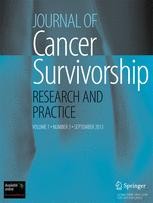Why are minorities underrepresented in genetic cancer studies?
New research shows that motivation for cancer survivors to provide samples for genetic tests depends on oncologist engagement or religion rather than race
Heidelberg | New York, 16 November 2017
 Socio-cultural and clinical factors as well as healthcare processes were important drivers of a woman’s willingness to provide saliva specimens for future cancer research. This is according to Vanessa B. Sheppard of Virginia Commonwealth University’s School of Medicine, lead author of a study in Springer’s Journal of Cancer Survivorship.
Socio-cultural and clinical factors as well as healthcare processes were important drivers of a woman’s willingness to provide saliva specimens for future cancer research. This is according to Vanessa B. Sheppard of Virginia Commonwealth University’s School of Medicine, lead author of a study in Springer’s Journal of Cancer Survivorship.
The study shows that women who had earlier-stage, less aggressive breast cancers, those who were less religious and experienced a greater sense of well-being, as well as those who had better access to healthcare were more likely to participate in genetic research.
Research into the provision of precision medicine based on genetic information is improving targeted treatment to specific breast cancer patients. Such genetic studies also help researchers understand why some patients survive, and others do not. Unfortunately, minorities tend to be underrepresented in these studies, with most samples being analyzed coming from non-Latino whites.
“This underrepresentation may diminish the potential impact of precision medicine if we do not know how to best tailor cancer treatment and prevention treatments to individual patient characteristics such as variability in genes, environment, lifestyle, and/or personal preferences,” explains Sheppard.
The current study therefore set out to fill gaps in the knowledge about how socio-cultural, healthcare, and clinical factors influence black and white breast cancer survivors’ participation in genetic research in black and white breast cancer survivors. Data was obtained from a telephone survey conducted among women with confirmed hormonal-positive breast cancer. They were then sent a mouthwash collection kit, and asked to participate in a study and to send their samples back.
“The most robust healthcare predictor was survivors’ satisfaction with the time spent with their oncologists,” notes Sheppard. “Interventions that target providers or patient-provider communication may be beneficial in the quest towards inclusion of breast cancer patients and survivors in genetic research; this is an area that is ripe for future research.”
Reference: Sheppard, V.B. et al (2017). Biospecimen donation among black and white breast cancer survivors: opportunities to promote precision medicine, Journal of Cancer Survivorship DOI: 10.1007/s11764-017-0646-8
Further Information
About the Journal of Cancer Survivorship
This research was funded in part by the National Cancer Institute (CA154848).
Services for Journalists
The full-text article is available to journalists on request.
Contact
Stella Müller | Springer Nature | Communications
tel +49 6221 487 8414 | stella.mueller@springer.com
